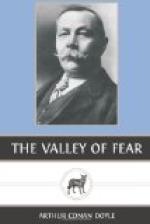“No, I never have.”
“Then how do you know about his rooms?”
“Ah, that’s another matter. I have been three times in his rooms, twice waiting for him under different pretexts and leaving before he came. Once — well, I can hardly tell about the once to an official detective. It was on the last occasion that I took the liberty of running over his papers — with the most unexpected results.”
“You found something compromising?”
“Absolutely nothing. That was what amazed me. However, you have now seen the point of the picture. It shows him to be a very wealthy man. How did he acquire wealth? He is unmarried. His younger brother is a station master in the west of England. His chair is worth seven hundred a year. And he owns a Greuze.”
“Well?”
“Surely the inference is plain.”
“You mean that he has a great income and that he must earn it in an illegal fashion?”
“Exactly. Of course I have other reasons for thinking so — dozens of exiguous threads which lead vaguely up towards the centre of the web where the poisonous, motionless creature is lurking. I only mention the Greuze because it brings the matter within the range of your own observation.”
“Well, Mr. Holmes, I admit that what you say is interesting: it’s more than interesting — it’s just wonderful. But let us have it a little clearer if you can. Is it forgery, coining, burglary — where does the money come from?”
“Have you ever read of Jonathan Wild?”
“Well, the name has a familiar sound. Someone in a novel, was he not? I don’t take much stock of detectives in novels — chaps that do things and never let you see how they do them. That’s just inspiration: not business.”
“Jonathan Wild wasn’t a detective, and he wasn’t in a novel. He was a master criminal, and he lived last century — 1750 or thereabouts.”
“Then he’s no use to me. I’m a practical man.”
“Mr. Mac, the most practical thing that you ever did in your life would be to shut yourself up for three months and read twelve hours a day at the annals of crime. Everything comes in circles — even Professor Moriarty. Jonathan Wild was the hidden force of the London criminals, to whom he sold his brains and his organization on a fifteen per cent commission. The old wheel turns, and the same spoke comes up. It’s all been done before, and will be again. I’ll tell you one or two things about Moriarty which may interest you.”
“You’ll interest me, right enough.”
“I happen to know who is the first link in his chain — a chain with this Napoleon-gone-wrong at one end, and a hundred broken fighting men, pickpockets, blackmailers, and card sharpers at the other, with every sort of crime in between. His chief of staff is Colonel Sebastian Moran, as aloof and guarded and inaccessible to the law as himself. What do you think he pays him?”




